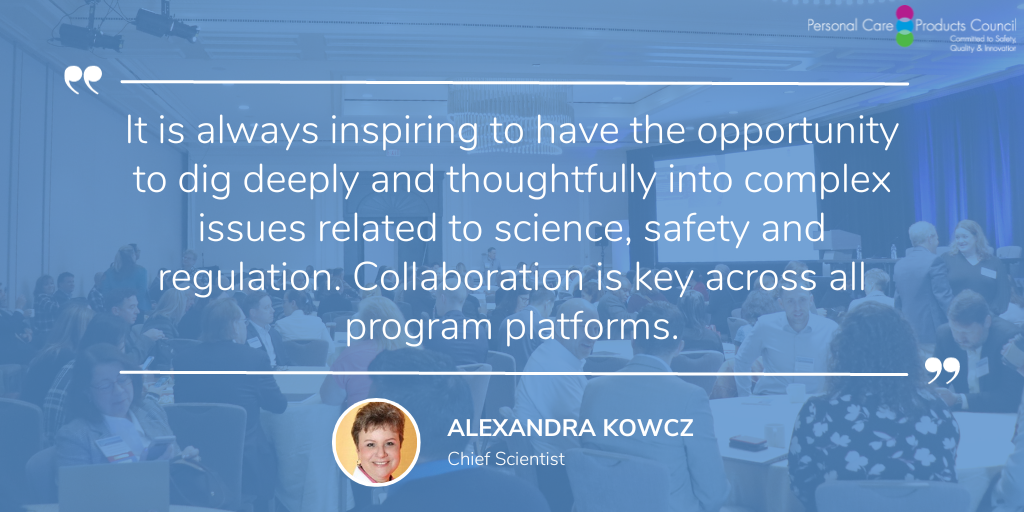Science Symposium … Bringing It All Together
By Alex Kowcz
Chief Scientist, PCPC
Last month, more than 300 scientists, industry leaders and regulatory officials gathered at PCPC’s Science Symposium for robust discussions about innovation, environmental science, microbiology advances, safety and quality in the personal care products industry; updated regulatory, safety and quality requirements; and understanding the latest science and technology developments. It is always inspiring to interact with my colleagues and have the opportunity to dig deeply and thoughtfully into complex issues related to science, safety and regulation. Collaboration is key across all program platforms.
I am pleased to share some important Science Symposium highlights:
Modernization of Cosmetics Regulation Act (MoCRA) Implementation
Linda Katz, M.D., director of the Office of Cosmetics and Colors (OCAC), U.S. Food and Drug Administration (FDA), opened the conference as the keynote speaker and updated attendees on the FDA’s ongoing implementation of MoCRA.
For more than a decade, PCPC and our member companies collaborated with a bipartisan group of congressional leaders and broad array of stakeholders to modernize and enhance the FDA’s regulatory authority over our industry and provide the safety reassurances that consumers expect and deserve. We celebrated the enactment of MoCRA in December 2022. This landmark legislation revamped FDA oversight for our sector, providing the FDA with enhanced regulatory tools, which are pivotal in ensuring product safety, promoting innovation and bolstering consumer trust.
MoCRA requires the FDA to implement new regulations in the next few years, and several provisions become enforceable beginning Dec. 29, 2023, including those related to safety substantiation, mandatory adverse event reporting, registration and product listing, mandatory recall authority, records access and labeling for professional use.
After providing an overview of the MoCRA implementation timetable, Dr. Katz noted that MoCRA includes a sense of Congress that opposes the use of animal testing on cosmetics products for product safety assessments and supports phasing it out, with the exception of appropriate allowances. She also noted that Congress explicitly supported the development of non-animal testing alternatives. The Symposium’s combined expertise and passion energized me as our industry continues to work closely with the FDA to implement MoCRA.
Sunscreens and the Environment
In 2022, the National Academies of Science recommended that the EPA conduct an ecological risk assessment (ERA) for all currently marketed UV filters and any new ones that become available. Sandy Raimondo, Ph.D, a research ecologist with the U.S. Environmental Protection Agency (EPA), provided an overview of an ERA of ultraviolet (UV) filters on coral reefs as sunscreens enter the environment through recreational activities and waste, and may ultimately reach coral reefs. Raimondo noted that the EPA protects the nation’s waterways under the Clean Water Act, while the FDA has regulatory authority over the cosmetics and personal care products industry.
According to Raimondo, coral reefs are a vital ecosystem stressed by climate change, destructive fishing practices, pollutants, invasive species and other factors. Raimondo spoke extensively about qualitative and quantitative data limitations to conduct a comprehensive ERA and cautioned that current available data is limited and more research is needed. She encouraged further global collaboration to advance scientific understanding on this important topic.
Microbiologist Training and Importance
The Symposium’s microbiology program focused on the importance of training the next generation of microbiologists. Michael Loewenstein, vice president of Scientific Consulting, Q Labs LLC, discussed the critical role of microbiologists in manufacturing to support compliance with the Current Good Manufacturing Practice (cGMP) regulations enforced by the FDA. Common issues with cGMP issues for sterile drugs include poor personnel practices, loss of environmental control and flawed operational design. Loewenstein emphasized that microbiologists in any laboratory operation foster collaboration across a variety of essential elements, from equipment and facilities design to disinfectant policies, process validation, investigations, training and maintenance.
In recognition of the outstanding contributions to the personal care products industry, PCPC launched its inaugural Early Career Microbiologist Award. The award recognizes individuals who demonstrate meaningful contributions to microbiology – developing new methods, designing preservatives or publishing patents – to encourage their continued growth in the industry.
Presented at the Symposium, PCPC awarded this distinction to Taylor Rienzo, Charles Rivers Laboratory, in recognition of her work in validating alternative microbiological methods. Her meticulous efforts and her commitment to advancing scientific methods in QC Micro have played a critical role in enhanced product quality and consumer safety. The award is a testament to Taylor’s exceptional expertise and dedication, which serve as an inspiration to other talented microbiologists.
Quality and Safety
The conference wrapped up with a focus on quality and safety. PCPC’s Tom Myers, EVP, Legal & Regulatory Affairs, facilitated a conversation with Prashiela Manga, Ph.D, deputy director, Office of Cosmetics and Colors, FDA, who presented the latest information on the status of FDA’s facility and product registration system for cosmetics and personal care products.
Michael Dourson, a board-certified toxicologist and director at TERA, an environmental science NGO, spoke about the complicated factors of measuring and analyzing ingredient risk exposure. Highlighting the importance of effectively communicating complex scientific information in easy-to-understand terms, he provided one of the more memorable quips of the conference: “No one drinks two liters of lipstick!” The takeaway: information regarding risk exposure always needs to be put into real-world context.
The beauty and personal care products industry has always been driven by science and safety. I have no doubt that new relationships were forged and existing relationships deepened at the Symposium to drive meaningful scientific collaboration for years to come. I believe the future of our industry will be bright – and beautiful – with many exciting innovations!

